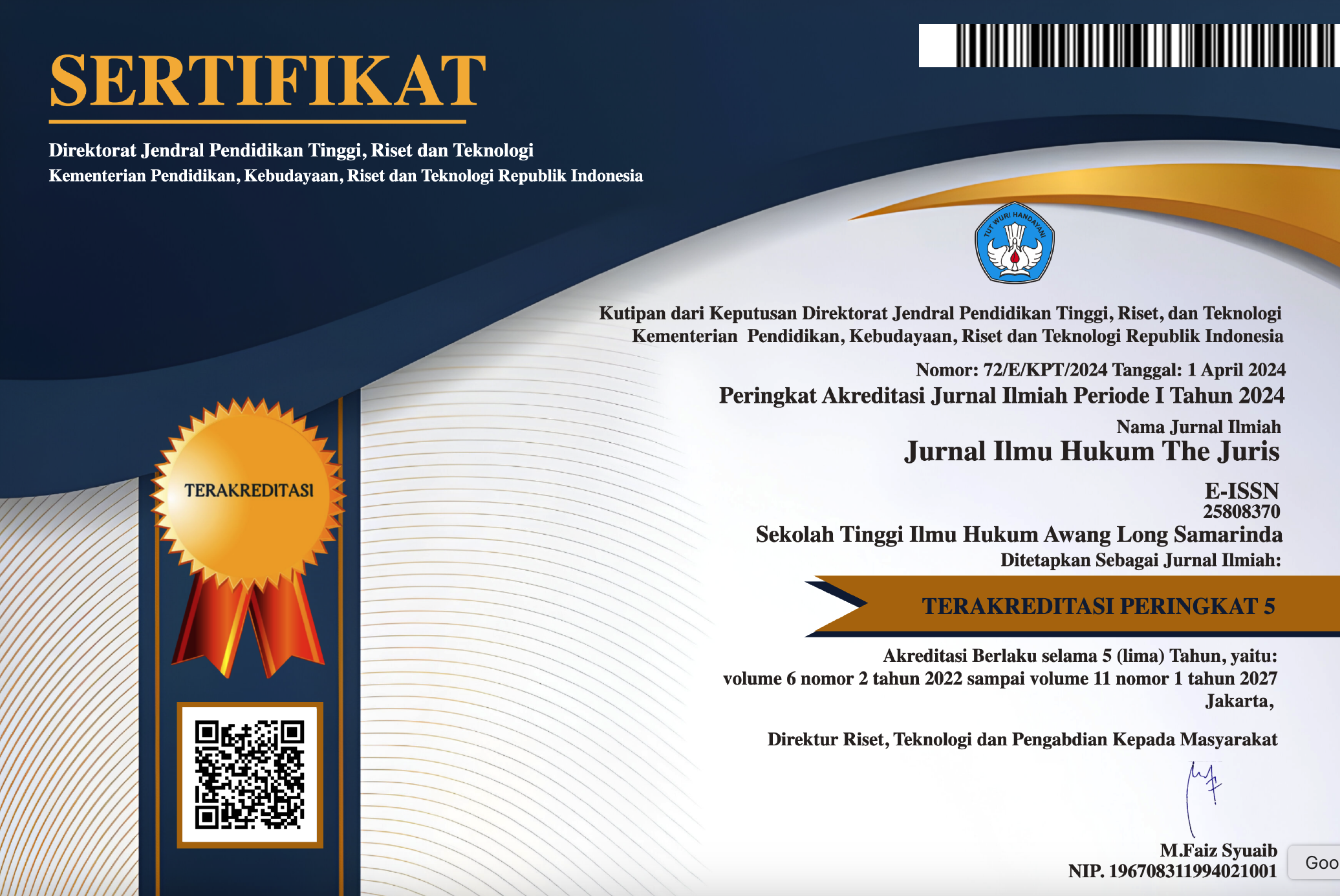PERAN DAN IMPLIKASI KAPSEL DALAM PENEGAKAN HUKUM PIDANA
Abstract
This paper discusses the role and implications of implementing the capsule concept in criminal law enforcement in Indonesia. Capsule is a legal approach that provides flexibility in the application of criminal sanctions, with the aim of accommodating the principle of substantive justice by considering the specific conditions of each case that occurs. This approach provides an opportunity for law enforcement officers to consider mitigating factors, such as age, psychological condition, socio-economic background, and the motivation of the perpetrator, to ensure that the punishment imposed not only fulfills the retributive aspect but also reflects rehabilitative and preventive values. In its implementation, capsules contribute to reducing the density of correctional institutions, increasing the effectiveness of perpetrator rehabilitation, and strengthening public trust in the existing criminal law system. This approach also supports legal reform that is more adaptive and responsive to ongoing social dynamics. However, its implementation faces challenges, especially in terms of regulations that are still not specific and resistance from some people who still view severe punishment as the main form of justice. Thus, capsules play an important role in creating a balance between law enforcement and human rights protection, as well as encouraging a more humane renewal of the justice system.
Downloads
References
Firmansyah, and Riska Amalia Armin. (2021). Sanksi/Pidana Kerja Sosial, Telaah Double Track System (Mono-Dualistik/Daad-Dader Strafrecht). Madani Legal Review 5, no. 2, hlm. 53-74.
Firdaus, Afifah, and Indra Yugha Koswara. (2024). Pembaharuan Hukum Pidana Di Indonesia: Analisis Tentang Pidana Pengawasan Dan Asas Keseimbangan. Lex Renaissance 19, no. 1, hlm. 1.
Flora, Henny Saida. (2017). Pendekatan Restorative Justice Dalam Penyelesaian Perkara Pidana Dalam SistemPeradilan Pidana Di Indonesia. Jurnal Law Pro JustitiaII, no. 2, hlm. 41-60.
Hutapea, Tagor, Zulkarnein Koto, and Syafruddin Syafruddin. (2024). Kebijakan Polri Dalam Upaya Mengefektifkan PenerapanKonsep Hukum PidanaBaru Dalam UU RI Nomor 1 Tahun 2023 TentangKitab Undang-Undang Hukum Pidana. Jurnal Ilmu Kepolisian 18, no. 1, hlm. 1-21. https://doi.org/10.35879/jik.v18i1.445.
Kastubi. (2024). Peran Penasihat Hukum Dalam Proses Peradilan Pidana The Role of Legal Counsel in the Criminal Justice Process. Jurnal Kolaboratif Sains 7, no. 7, hlm. 2337-2349. https://doi.org/10.56338/jks.v7i7.5469.
Kurniasi, Ririn. (2024). Penerapan Restorative Justice Terhadap Anak Yang Menjadi Pelaku Tindak Pidana Melalui Diversi. Unes Law Review 6, no. 4, hlm. 10821-10828.
Masturi, Ade. (2019). Kecerdasan Komunikasi Dan Kesehatan Mental. Dakwah: Jurnal Kajian Dakwah Dan Kemasyarakatan 22, no. 2, hlm. 107-122. https://doi.org/10.15408/dakwah.v22i2.12063.
Nugroho, Yoga, and Pujiyono Pujiyono. (2022). Penegakan Hukum Pelanggaran Lalu Lintas Oleh Anak: Analisis KepastianDan Penghambat. Jurnal Pembangunan Hukum Indonesia 4, no. 1, hlm. 49-60. https://doi.org/10.14710/jphi.v4i1.49-60.
Ratna Dewi, Heri Mudjiyono, Abraham Leonardlee, Augpa Azisa. (2024). Analisis Kapita Selekta Dalam Hukum Acara Perdata Terhadap Implementasi Prinsip-Prinsip DasarDalam Penyelesaian Perselisihan Perdata Analysis. JICN: Jurnal Intelek Dan Cendiwan Nusantara 1, no. 1, hlm. 1006-1013.
Urrutab, Muhammad Rafi. (2021). Konsep Keadilan Restoratif Dalam Penegakan Hukum Pidana Di Masa Pandemi Covid 19. Syntax Idea 75, no. 17, hlm. 399-405.
Copyright (c) 2024 Reny Okprianti, Nur Husni Emilson, Nailah Ramadhania, Saffana Nadira, Adelia Oktarina Anggraini, Windri Freza

This work is licensed under a Creative Commons Attribution-ShareAlike 4.0 International License.







